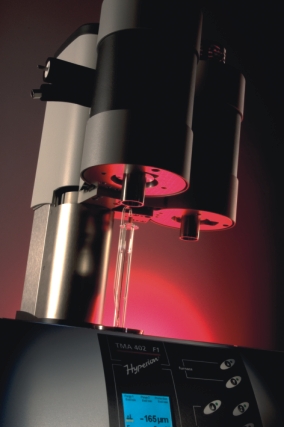Thermomechanical analysis is a widely used tool to investigate expansion, shrinkage or softening of samples as a function of temperature under a defined load. Main focus is the determination of the coefficient of thermal expansion (CTE) of polymers, composites, metals, ceramics and glasses.
 The TMA 402 Hyperion® from Netzsch
The TMA 402 Hyperion® from Netzsch
The newly developed TMA 402 Hyperion from Netzsch accommodates specimens up to 30 mm long, whose thermomechanical properties can be investigated under a force of up to 3 N. A built-in force sensor ensures that forces can be reliably adjusted with mN-accuracy. Everything is completely software-controlled.
The new instrument comes in two versions both of them allow the force to be modified stepwise or linearly at any point during the measurement. The premium version TMA 402 F1 additionally features the possibility of continuous force modulation as a saw tooth, square or sinusoidal wave with a freely selectable frequency up to 1 Hz. Hence, a great variety of experiments is possible, including:
- Coefficient of thermal expansion (CTE)
- Stress sweep
- Creep
- Softening
- Visco-elastic properties (Young's modulus)
All components of the TMA 402 Hyperion are vacuum-tight to ensure a pure atmosphere around the sample. Due to the compact design, all necessary electronics as well as the (optional) mass flow controllers for purge gases are included in one chassis.
In order to expand possible applications to higher temperatures, e.g. sintering of ceramics, the modular system concept allows the exchange of the furnace:
- the low-temperature steel furnace can be equipped with a liquid nitrogen cooling system, allowing for a temperature range of -150°C to 1000°C
- the SiC-furnace can be used from ambient temperature upwards and reaches up to 1550°C
An extensive range of sample holder systems is available for expansion, penetration, tension or 3-point bending measurements.
A Variety of Application Fields
Its flexibility and the wide range of different measurement possibilities make the TMA 402 Hyperion the instrument of choice in countless application fields:
- Analysis of the glass transition and softening point
- Characterization of visco-elastic properties of polymers
- Optimization of sintering processes of ceramics